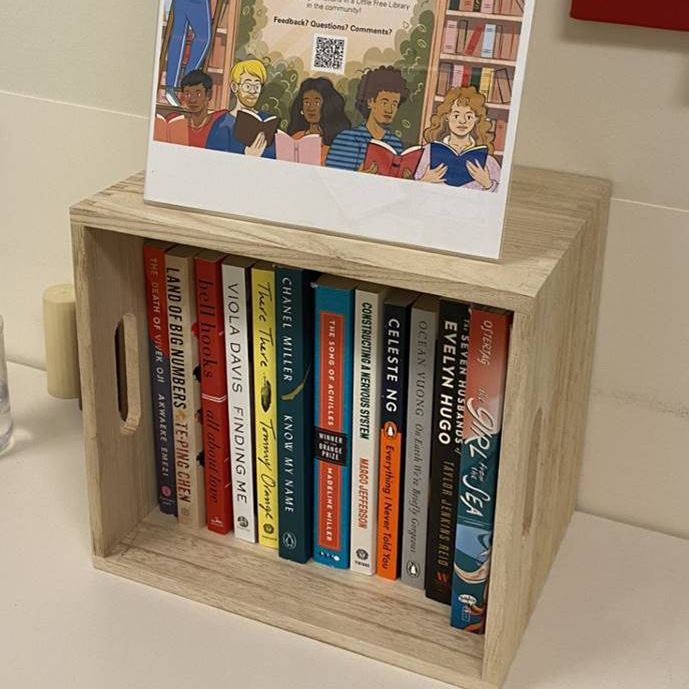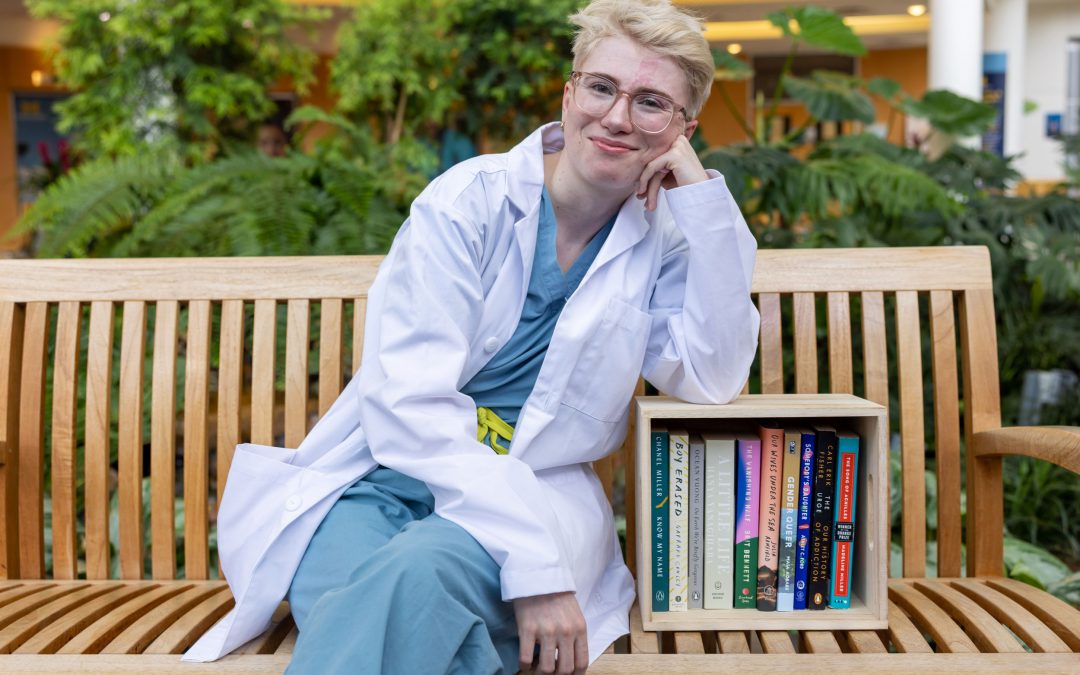Chelsea Fisk (she/they), a clinical researcher in cardiac surgery, developed the Health Equity Literature Archive, an innovative diversity, equity and inclusion (DEI) education pilot that provides Michigan Medicine employees working in the FCVC with access to diverse literature through a series of mobile libraries. Funded by RISE, each library includes a range of titles — including fiction, non-fiction, memoirs, biographies, poetry, graphic novels and more — by and about people of diverse identities.
Imagine discovering a treasure trove of diverse literature in unexpected corners of your workplace. That’s exactly what employees working in the Frankel Cardiovascular Center (FCVC) experienced last fall as mobile libraries began appearing, thanks to an innovative pilot led by clinical researcher Chelsea Fisk.
Known as the Health Equity Literature Archive, Fisk’s goal was to cultivate empathy and understanding for people from different backgrounds and diverse identities by providing employees with access to diverse literature. The pilot served as a form of DEI education that was free to use, self-paced and barrier-free — there was not a formal check-out process and no return due dates. Employees could take the books home, read them during breaks, and keep them as long as they’d like before returning them.
“Engaging with diverse literature is an evidence-based way to facilitate understanding of and empathy for people of marginalized identities,” Fisk shared. “One of the things that makes this project unique is that not only is it physically housed in the workplace, it is self-paced and self-initiated. It’s completely up to the employee when and how they interact with the initiative.”

One of five mobile libraries containing diverse literature for the Health Equity Literature Archive
The Health Equity Literature Archive pilot launched in August 2023. At launch, the pilot consisted of more than 200 books purchased from local Ann Arbor bookstore, Booksweet. A total of five libraries were installed on five floors of the FCVC in staff-only areas, including the outpatient clinic, the OR and the administrative suite. Books were replaced as they were checked out, with nearly 100% of books finding homes during the pilot phase.
“Book subjects covered a wide range of marginalized identities, including race, gender identity, ability and disability, LGBTQ+ identity and other diverse lived experiences. We were very intentional in making the collection as intersectional as possible so that the majority of the books represent multiple layered identities to better reach and connect with a wider audience,” said Fisk.
Fisk often received feedback from her colleagues about the pilot during casual conversations. Many liked that the books were easy to access and that the titles were already curated, reducing their need to seek out these stories on their own. Others reported reduced screen time on breaks, while one user shared, “I appreciated having easy access to diverse stories in my workplace.”
Receiving Support from RISE
The RISE Innovation Development Program supports education innovators at Michigan Medicine in a variety of roles, including faculty, staff and learners. There is no requirement to hold a specific degree, or work in a certain role. Fisk found this very appealing when looking for a way to receive support and funding for their pilot.
“As a non-faculty, non-physician staff member, I think oftentimes we are overlooked in formal funding opportunities. RISE is very intentional about being open to everybody and treats everyone equally regardless of their professional or educational background.”
RISE Innovators meet once a month with other members of their cohort to develop skills, share ideas and problem solve. Fisk found this especially helpful when debating whether to keep the libraries barrier-free or follow a traditional library format that recorded borrowers’ information and tracked due dates.
“My co-innovators really championed my perspective to look past what was traditionally expected and focus instead on what was most important, which was giving people easy access to the materials,” shared Fisk. “Staying barrier-free is staying true to the heart of the project.”
Impact of the Archive
While formal DEI programs and training exist throughout Michigan Medicine, this pilot helped fill a gap for employees looking to learn about DEI topics at their own pace, customized to their own reading interests. The pilot allowed them to read on a schedule that worked best to support their learning needs. And Fisk hopes it will have ripple effects beyond the Michigan Medicine community.
“The lasting impact of the Health Equity Literature Archive is that it is a renewable resource, in a way. The reader who initially borrowed the book may lend it to friends or family members, or they may pick it up again months or years down the road. The project also supported a local community bookstore, which is another great impact,” said Fisk.
Fisk hopes that those who read the books walk away with a new outlook.
“Books are life-changing and perspective-changing for so many people, and if even one person thinks of things in a new way, or feels seen and understood by the books in this project, it has done its job.”
While the pilot may be over, the majority of titles have been borrowed and Fisk is currently seeking additional funding to expand the project to other areas within Michigan Medicine. They are also interested in partnering with other campus units who are interested in bringing the project to their buildings.
Looking ahead, Fisk hopes that with additional funding, the Health Equity Literature Archive can extend its reach beyond the walls of the FCVC to other Michigan Medicine buildings, providing even greater access to employees and learners who wish to learn more about the experiences of others through a good book.

Curious about the titles available through the Health Equity Literature Archive? Click to view a list of the diverse literature that was included in this pilot.
If you are interested in learning more from Chelsea Fisk about the Health Equity Literature Archive, please email fiskc@med.umich.edu.
To stay informed about RISE opportunities and education innovations happening at Michigan Medicine, join our community.
Photo credits: Camren Clouthier, Chelsea Fisk
